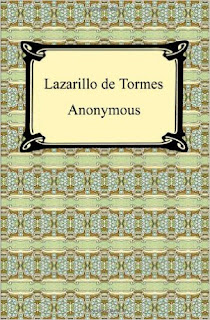Lazarillo de Tormes
Still on
the Iberian peninsula I am blazing through the decades and halfway through the
sixteenth century I find ”Lazarillo de Tormes”, a small book with a major punch.
This book is in fact so subversive that the author has remained anonymous
through the centuries and it was banned by the Spanish Inquisition. Why?
Because it is an irreverent tale about a greedy church, vain nobility and lusty
clergy. I have no doubt in my mind that this is a fair description of all
these, but if you want to keep the peasants under the thumb you have to
suppress such ill-founded rumors…
“Lazarillo de Tormes” is a short, picaresque
novel about a boy going through a host of masters. Most of these are horrible
masters who beat or starve him and only through his own cleverness does he
manage to stay afloat.
He first
master is a blind man who keeps food and wine to himself and uses harsh
violence to exert his dominance over boy. To stay alive Lazarillo finds ways to
steal food from him such a sucking up wine with a long straw, which in turn
earns him some serious trashing. The next master is not much better, a
clergyman who locks up all the food while starving the boy. Here he develops a
cunning scheme to simulate a rat or snake attack on the food chest and for a while
he gets away with it. Then on to a nobleman, who may look like a ton of money,
but has got nothing at all. Instead they survive on the boys begging and so on.
Through it
all Lazarillo goes through some horrible things, yet manage by using his head
and while that is amusing in its own right it is not really the point of the
story. That is instead the pictures being drawn of his masters. These are not flattering
to say the least and the implied criticism reaches a climax in the story of the
seller of papal indulgences, which is revealed as a complete scam taking
advantage of gullible peasants. It is always fun when self-righteous fools are
exposed of their hypocrisy and no doubt that is much of the reason for the fame
of the book. I even think it is funny here four and a half century later.
I loved the
ending of the story. Lazarillo befriends an archpriest and agrees to marry his
servant girl. The servant walk in and out of the priest’s house, which makes
people talk, but of course Lazarillo trusts his wife and the priest is very
supportive…. Hmmmm. I know what is going on…
“Lazarillo
de Tormes” founded a style, the picaresque novel, that became a staple for
centuries to come. Even today you can find novels written in this episodic
style and I suppose literature owes it a lot. It is a very easy read and the
translation I found was very decent, albeit old. It was translated by Sir
Clements Markham probably around the turn of the century, who, I found out,
lived a most exciting life as a polar explorer. That story is in fact probably
even more interesting than this book he translated. You tend to think of literature
scholars as dusty, boring types and this fellow was anything but.
At less
than a hundred pages this was a fast read. My next book arrived yesterday and I
found to my horror that it is a thousand pages. Ah, well, looks like this page
will be quiet for a while.
